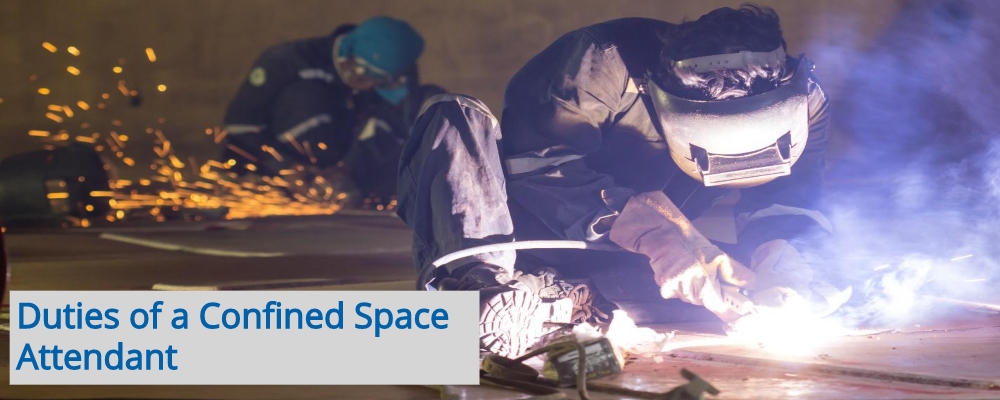Duties of a Confined Space Attendant
01/15/2020
Category : Industrial Safety

Duties of a Confined Space Attendant
Have you ever had to do a confined space entry at your job? Even if you haven’t, odds are that some of your employees have.
Confined spaces are usually entered for maintenance, cleaning or inspection. Confined space work can be confining and dangerous. But there are ways to protect employees from the hazards of these spaces.
One of the most crucial parts of confined space entry is having an attendant. The confined space attendant, or “hole-watch,” plays a critical role in ensuring the safety of their fellow workers.
Tip: Ask your employees if they know the three roles necessary for permit-required spaces. Their answer should be 1) the entrant, 2) an attendant, and 3) the supervisor. Focus on the duties of the attendant for the rest of this tailgate meeting.
Confined Space Requirements
In years past, confined spaces had high numbers of serious injuries and deaths. As a result, OSHA developed rules about working safely in and around these spaces. Standard 1910.146 states that all permit-required spaces must have an attendant present.
The standard also explains that before entry, workers must complete an entry permit. This should be done as a team, with all affected employees present. The supervisor should lead the meeting. The entrants and attendants need to get involved as well.
Here’s an example of what an entry permit looks like.
Use of Gas Detection
Standard 1910.146 has other requirements as well. For example, employees must use a gas detection monitor to test the atmosphere for hazardous gases (OSHA Fact Sheet: Procedures for Atmospheric Testing in Confined Spaces). The presence of any hazardous gases means that extra precautions may be necessary.
Duties of the Attendant
Confined space attendants have very specific training requirements. The employer must ensure that attendants meet the requirements stated in OSHA regulation 1910.146(i).
Tip: Ask your employees to list some of the duties of an attendant. Encourage them to participate in this meeting. If they don’t shout out the answers, call on a few of them who’ve been an attendant before.
As per minimum requirements, the attendant must always:
- Know the specific hazards that entrants may encounter.
- Be able to recognize signs and symptoms of those hazards.
- Be aware of behavioral effects from hazards that the entrants may encounter.
Maintain an accurate count of who is in the space.
Communicate with entrants to monitor their status.
Remain outside the space until the work is done or another attendant takes over.
Warn unauthorized employees to not enter the space.
Inform the entrants and the supervisor if unauthorized workers have entered the space.
Avoid doing any work that would interfere with their ability to monitor the space.
In emergency situations, the attendant must also:
Order the entrants to evacuate if any of the following takes place:
The attendant detects a hazardous condition.
There is a situation outside the space that could endanger the entrants.
The attendant must leave their post for any reason.
Perform non-entry rescue as instructed by the employer.
Summon a rescue team if entrants are unable to escape the space on their own.
Enter the space for rescue, only if specifically trained and able to do so.
Being a confined space attendant is an important job. The attendant needs to have sufficient training to keep his/her fellow workers/employees safe.
Unfortunately, many workplaces don’t take the duties of a confined space attendant seriously. Often times, this task gets assigned to the newest employee who "needs something to do." But, having a trained attendant is one of the best ways to protect the workers inside the space.
Make sure your attendants know how important their job is. Challenge them to stay on their toes and to identify hazards. The workers inside will appreciate having someone who’s watching out for them. Wouldn’t you? They’ll feel a lot better about being in that space.
Tip: Ask the group to raise their hands if they’ve been involved in confined space entry. Ask who’s been an attendant. Encourage them to share their experiences with some of these duties. Have any of them had to summon rescue services?
Confined Space Incidents
Take the time to train your employees. Put these precautions in place. A solid confined space program will reduce the chances of having an injury or death at your jobsite.
Confined space entry can be deadly. Sadly, there have been many reports of improper confined space hazards causing worker LODD.
Tip: Discuss the difficult situation that these workers encountered. They knew that one of their co-workers was down below and needed help. It’s a natural human instinct to want to go in and try to save him. However, with hazardous atmospheres and confined space entry, workers cannot take additional risks. Doing so may result in multiple fatalities instead of one.
More on Confined Space Safety
A well-trained attendant can have a direct impact on the outcome of a confined space entry.
Hopefully this post gave you some good talking points to review with your employees. As with any tailgate meeting, you should encourage workers to actively participate. They’ll feel more valued if you ask for their input. Plus, they’ll retain the information better.
For municipal workers, extra safety precautions may be necessary. For example, check out Appendix E from the 1910.146 standard. It reviews the additional requirements that workers should follow when entering sewer systems.
Additional confined space references are available via OSHA here: https://www.osha.gov/SLTC/confinedspaces/ ; the UC Santa Cruz here: https://ehs.ucsc.edu/programs/safety-ih/confined-space.html ; and the California Department of Industrial Relations here: https://www.dir.ca.gov/Title8/5157.html
Remember, knowledge is key. The more awareness and understanding your employees have, the safer they’ll be.

